From «Putler» to Graffiti: How Russia Criminalizes Mocking Putin
Over the past 6.5 years, nearly 400 people have faced court for criticizing or mocking the president
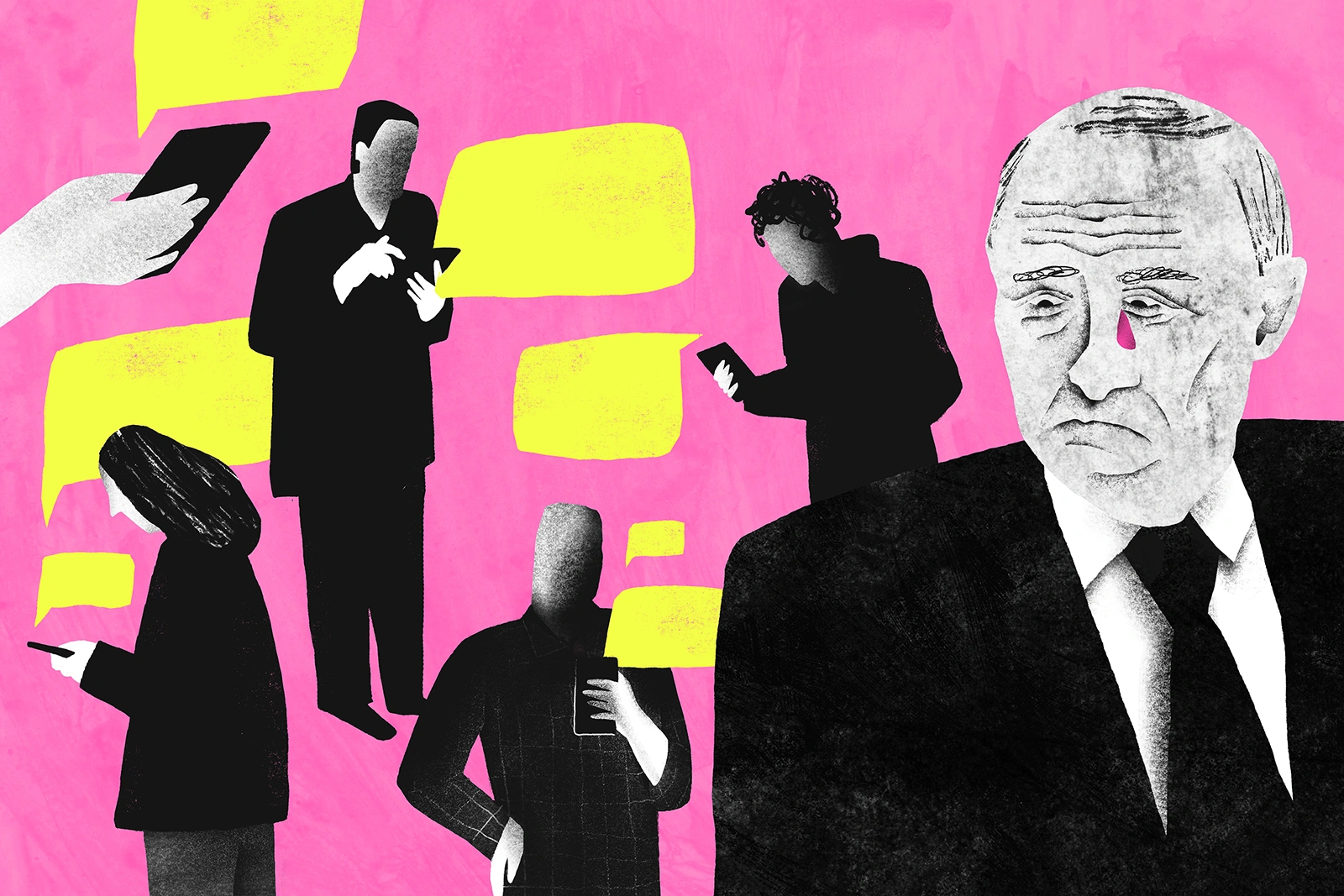
«We are now under Putler—oh, I mean Putin,» said Crimean student Yevgeny Vyunikov in the winter of 2024 during a Chatroulette conversation. Three weeks later, local pro-government activists tracked him down and handed him over to the police. The student was forced to make a public apology and pay a fine of 50,000 rubles (approx 530 EUR).
To read future texts, follow us on Telegram
This case is one of several hundred identified by Verstka. To prosecute Russians for insulting Vladimir Putin, law enforcement uses an administrative article on disorderly conduct (or «petty hooliganism» if translated word-to-word from Russian) In 2019, amendments were introduced into this law, making it easier to punish those who «disrespect» the authorities. Fines or even arrests can be imposed not only for the word «Putler,» but also for phrases like «Putin is a criminal» or for posting an image of the president with a mourning ribbon. Verstka analyzed court rulings to find out what cannot be said about the Russian president.
The Number of Putin Insult Cases Began Rising in 2022
Since 2019, Russian courts and courts in annexed Crimea have seen at least 391 administrative cases of insulting the president, discovered Verstka. At least 379 people have become defendants; 10 of them were fined multiple times over different years. Almost all are found guilty. Judges returned only six charge sheets to the police, and 28 cases were dropped due to statute of limitations or lack of evidence.
At least 12 people have been put under administrative arrest over these years for «disrespecting» Putin. Fines were handed to at least 332 people, according to Verstka’s count. Two Russians were punished three times. One of them, former Perm (a сity near Ural mountains) deputy Konstantin Okunev, not only became a «repeat offender» but also paid the largest fine: a post describing the Russian president as «an inadequate person who has lost his mind» cost him 250,000 rubles (approx 2650 EUR).
Cases surged after Russia’s full-scale invasion of Ukraine. In 2019, Verstka found 40 cases, in 2020 — 54, in 2021 — 33. In 2022, the number jumped to at least 84. In 2023, it dipped again to 54, but in 2024 it rose sharply to at least 91. By July 2025 alone, judges had already considered at least 35 cases.
All were classified as disorderly conduct, mostly under Part 3 of Article 20.1 of the Administrative Code, a special provision targeting «disrespect» toward authorities online. It was introduced in March 2019 by a group of lawmakers from the pro-government United Russia political party.
Law enforcement eagerly used this law. For insulting Putin alone, Russians collectively paid at least 11.5 million rubles (almost 122 thousand EUR) in fines. These fines are steep: the minimum is 30,000 rubles (which is almost 320 EUR and almost twice the minimum living wage), and the maximum is 100,000 rubles (which is 1060 EUR and is comparable to Russia’s official average salary). For comparison, the fine for domestic violence ranges from 5,000 to 30,000 rubles (approx 53–320 EUR).
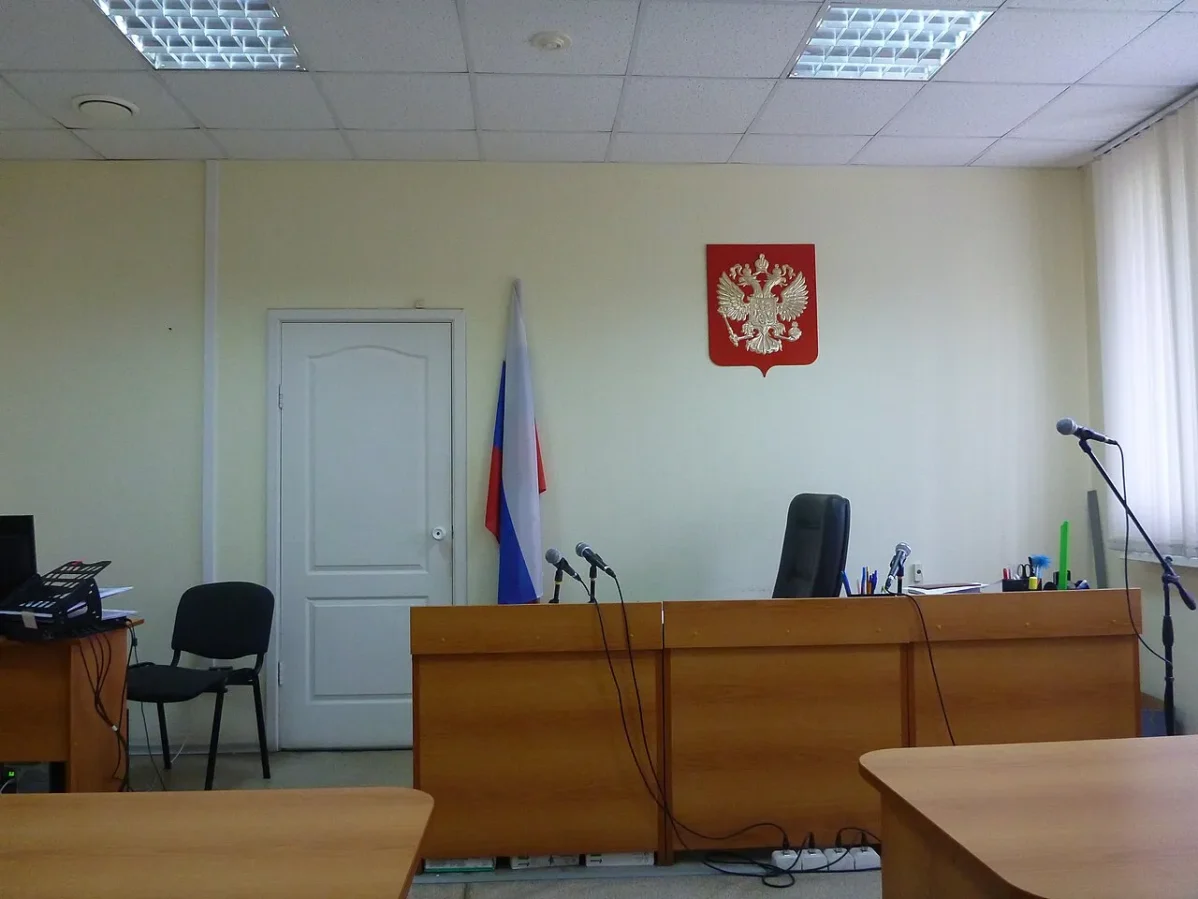
How We Counted
To calculate the figures, we use several parsers, including those developed by Russian NGOs focused on legal help such as OVD-Info. With these tools, we downloaded court rulings from Russian websites on disorderly conduct cases (Article 20.1 of the Administrative Code) for the period from January 2020 to July 2025. From that dataset, we selected only the cases related to insults («disrespect») toward Vladimir Putin. The true number may be higher, as Russian courts do not always publish their rulings.
As part of this study, we did not examine cases under the articles on incitement of hatred or enmity, which could also include instances of “disrespect” toward the president. We focused specifically on Article 20.1 of the Administrative Code, since it is the main provision used to draw up charge sheets for insults and «disrespect» toward the president, officials, and the police.
Anything Can Be an «Insult»: A Comment, SMS, or Private Video In Messenger
Insults to Putin, in the eyes of police, include not only disparaging remarks about his personality but also criticism of his actions or comparing him with war criminals.
In autumn 2023, Crimean resident Vladislav Kislyakov was fined 60,000 rubles (almost 640 EUR) for posting two photos on VKontakte (Russian social network) — one of Putin, one of Hitler. Beside Putin’s photo was his quote: «Crimea has always been and remains an integral part of Russia.» Beside Hitler’s photo were his words: «Danzig is a German city.»
Police and the FSB can detect «disrespect» in posts, comments, video reposts, messages in group chats, caricatures, graffiti, or inscriptions on fences and walls.
In January 2023, Voronezh (a city in Southwestern Russia) resident Maxim Murodyan was fined 30,000 rubles (almost 320 EUR) over a Twitch stream. What he said is still unknown, but the judge ruled he insulted «the human dignity and public morality of the Russian president.»
It does not matter how many people witness the insult. In autumn 2024, Dmitry Vanifatiev, a fishing lure maker from Volzhsky, Volgograd region, was fined 30,000 rubles (almost 320 EUR) for videos he shared with just 15 followers in his Telegram channel. According to the court, he used «crude, contemptuous, vulgar language» about Putin. His videos had only 14–20 views when the charge sheet was drawn up.
To catch offenders, law enforcement conducts surveillance operations, monitoring social networks and streams. Sometimes, ordinary citizens also file complaints, as happens with army «discreditation» cases.
In winter 2025, Nina Yakovleva, a cleaner at School No. 41 in Stavropol (a city in Southern Russia), was fined 50,000 rubles (530 EUR) after sending messages to a colleague while being drunk that included insults «against her, the school, and the President.» The colleague reported her to police the next day.
Crimea Tops the List for Putin Insult Cases
No region has more such cases than annexed Crimea. Over 6.5 years, at least 50 people there were fined, and at least one was jailed.
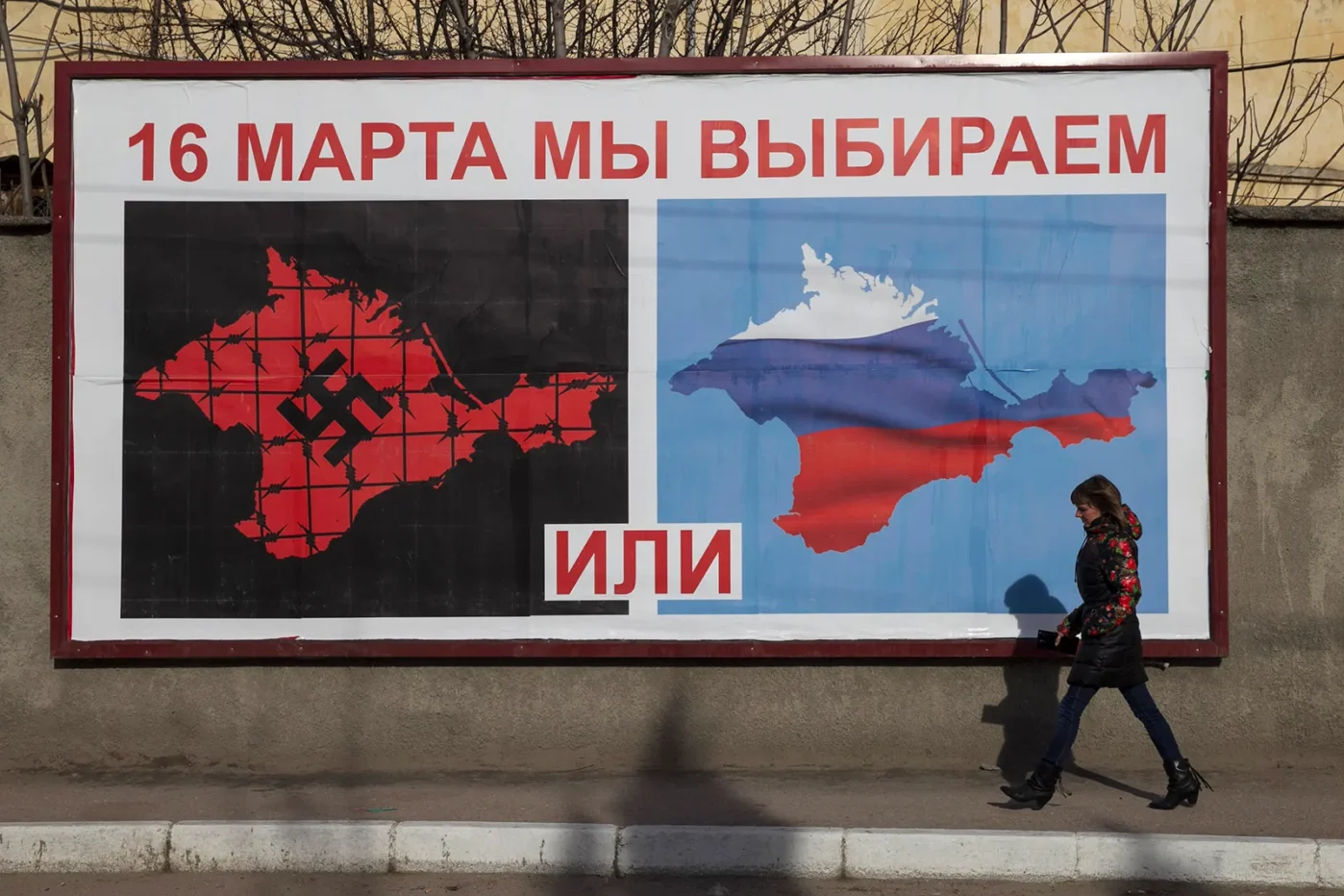
In one case, a woman from Dzhankoi (a city in Northern Crimea) was fined 30,000 rubles (almost 320 EUR) for posting on Instagram a viral, yet fake video clip from The Simpsons showing characters spitting and dancing on a grave marked «Putin.» In the original, they desecrated the grave of billionaire Mr. Burns.
Another Crimean, student Yevgeny Vyunikov, received a 50,000-ruble (530 EUR) fine after calling Putin «Putler» in a Chatroulette conversation. Local pro-Kremlin activists denounced him, filmed his forced apology, and spread it online. He was also jailed for five days after police photographed his tattoos resembling Iron Cross awards of the Nazi-period German Army.
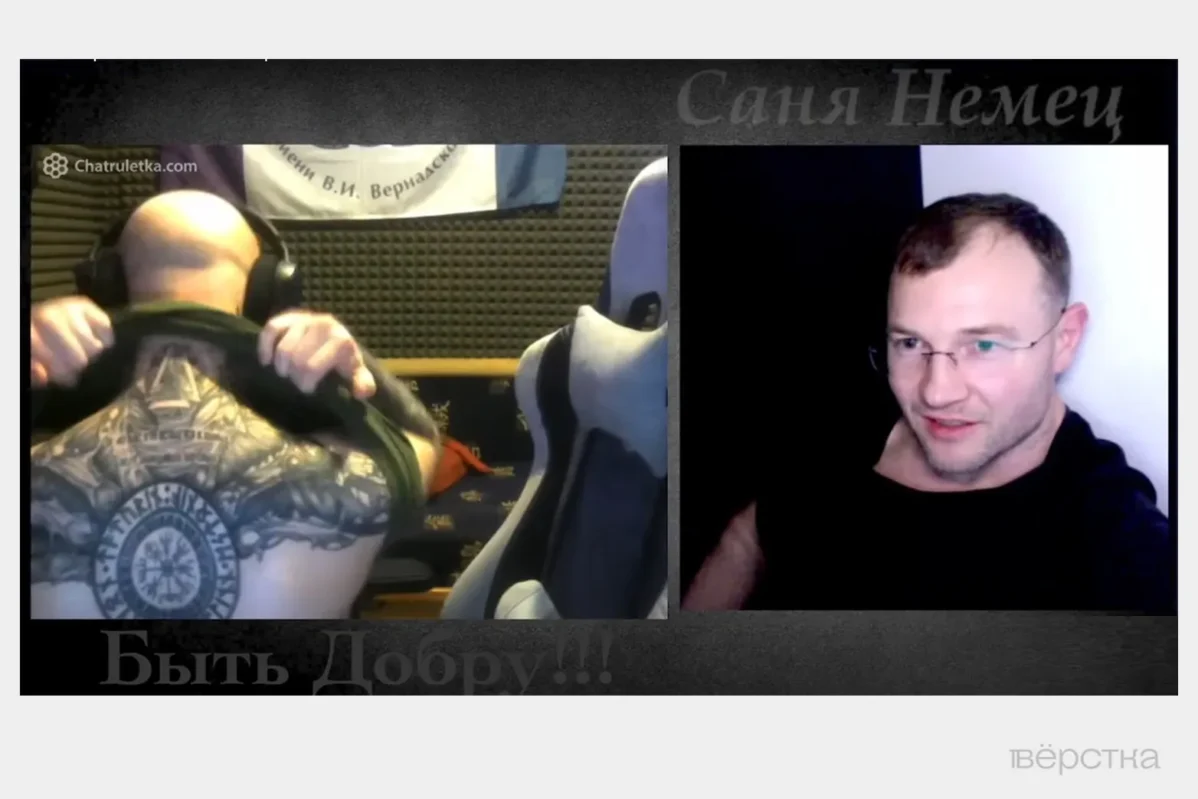
What Gets You Jailed for «Insulting» Putin
While fines are the usual penalty, at least 12 people have been jailed in detention centers for «disrespect.»
In February 2024, near Moscow, Ekaterina Fefilova was sentenced to 10 days for spray-painting «Putin khuilo» (Putin is a dickhead) on a wall. Days later, another local, Sergey Fedotov, got 10 days for shouting obscenities about Putin in public.
In Moscow in 2022, two women, Marina Filatova and Alyona Isaeva, shouted insults about Putin and spray-painted slogans. They were jailed for 13 and 14 days. In Crimea in 2024, Igor Braguta got three days for posting offensive Putin images on Odnoklassniki (Russian social network).
Minimum Fine: 500 Rubles. Maximum: 250,000
Arrests are rare; hefty fines are far more common. In 90% of cases, the fine exceeded 30,000 rubles (almost 320 EUR). Some reached 100,000 (approx 1060 EUR).
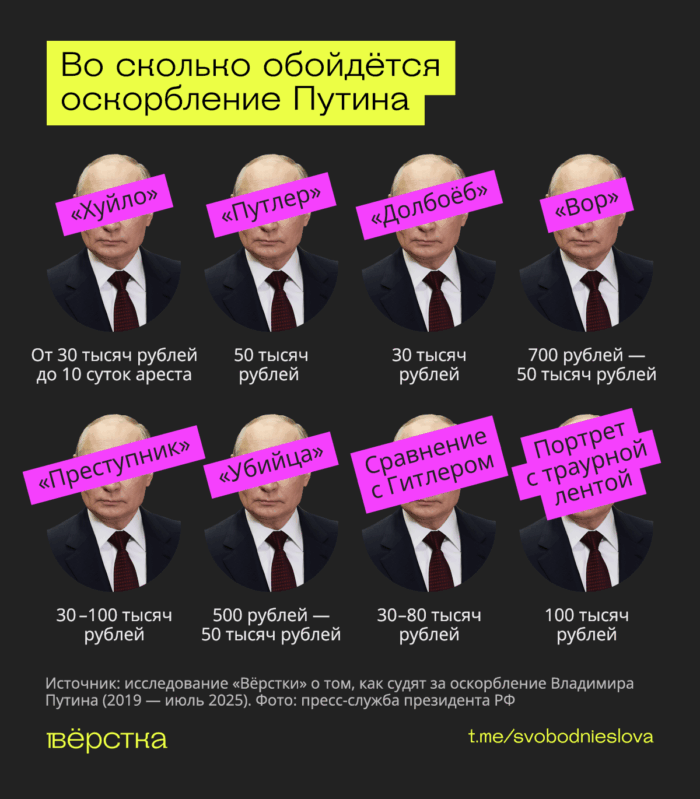
In the Sverdlovsk region close to the Ural mountains, Vladimir Burykin was fined just 500 (slightly more than 5 EUR) rubles for painting «Putin, murderous bastard» on a wall. Meanwhile, another man in Khimki (a Moscow suburb) was fined 100,000 rubles (approx 1060 EUR) for saving a portrait of Putin with a mourning ribbon on VKontakte.
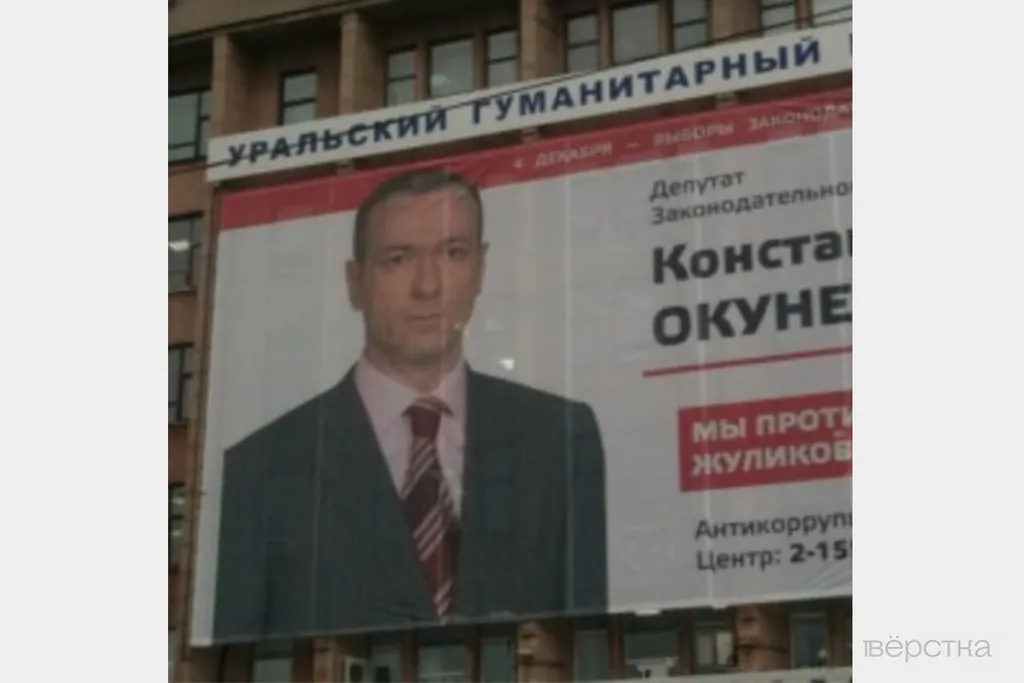
The record fine — 250,000 rubles (approx 2650 EUR) — went to opposition activist and businessman Konstantin Okunev. His post described Putin as having dragged Russia into «darkness and hell» over 23 years of «criminal and meaningless rule.»
Police-appointed linguists concluded his words amounted to «a derogatory, dismissive characterization of Putin’s personality, defining him as inadequate and insane.»
Okunev lost all his appeals but says it is still important to contest such cases: «We understand that in Mordor, there will be no other laws for us. But I believe we must use the tools available.»
Cover: Lialia Bulanova
Verstka is an independent Russian publication , we do not have a single investor either in Russia or abroad. Your donations are very important for us, they allow us to maintain our independence and continue our work—honestly and professionally. Support Verstka Media →